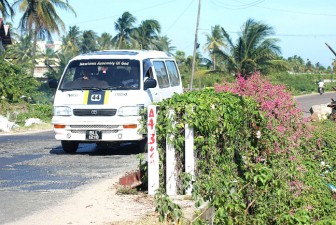The Guyana Prison Service (GPS) welcomed 21 new recruits into the system after they completed an eight-week Basic Recruit Training Course (BRTC) at the Prison Training Centre at Lusignan.
The recruits were drawn from the five prison locations across the country and they were exposed to basic prison lectures, impromptu speech delivery, armed and unarmed combat, human rights education, family life training, and English. According to a Government Information Agency (GINA) press release David Dias from the New Amsterdam Prison, was named the best recruit gaining 87 per cent. The BRTC was coordinated by Assistant Superintendent of Prisons Paul James who recorded an 86 per cent pass rate.

Delivering the charge, Minister of Home Affairs Clement Rohee told the group that government provides training for all ranks of the disciplined services to boost capacity. “Training at various levels is an ongoing exercise and an integral part of the capacity building and institutional strengthening of the organisations that form the disciplined services,” he said.
In this regard, government makes provisions every year in the national budget to cater for ranks to be trained. However, training programmes for the prison service also include courses on custodial duties, welfare, and rehabilitation responsibilities. Rohee said the GPS Training Board has performed notably to ensure that suitable programmes are developed. The BRTC is a part of this programme.
Having completed the training, the recruits will be transferred to the various prison locations. The minister urged them to acquaint themselves with the peculiarities of the different prisons as there are significant differences at the various locations. “It is important that you become aware of the conditions at each location in advance of your posting so as to facilitate an easier adaptation process,” he said.
The minister also charged the recruits to ensure that the inalienable rights of the prisoners are not trampled during their period of incarceration. “Law enforcement in the wider society has a number of challenges because you are operating within the full view of individuals, however within the context of the prisons, it is taking place within the confines of the prison and anything that is happening away from the eyes of the general public, always comes under greater scrutiny,” he said.
According to Rohee efforts have to be made to reconcile the human rights of the prisoners with the type of governance that reflects a high degree of responsibility, professionalism and an awareness of what is expected by the wider society. Recruits were also reminded of the GPS’s zero-tolerance policy regarding persons smuggling unauthorised items into the prisons.
Director of Prisons, Dale Erskine in his remarks said that the prison service administration is pleased to have the recruits join the GPS. He also informed them that the prison environment is very complex and multi-dimensional and ranks are expected to execute their tasks in a very effective manner. “To manage prison security is very challenging, since there are always inmates who would try to escape,” he said. Erskine noted too that often, the difficulties that prison officers have had to overcome are given little credence and respect from certain sections of the public.





